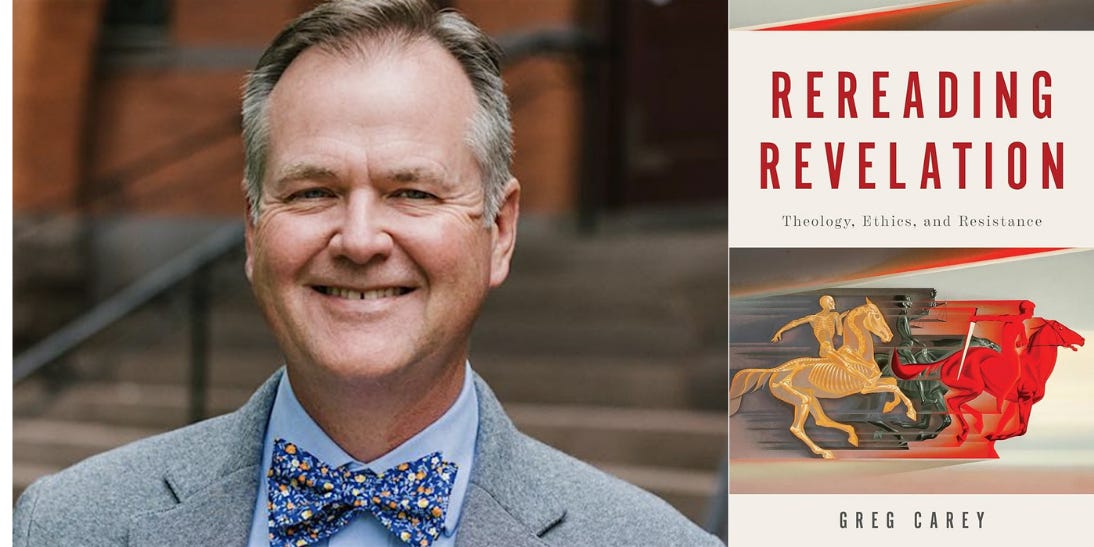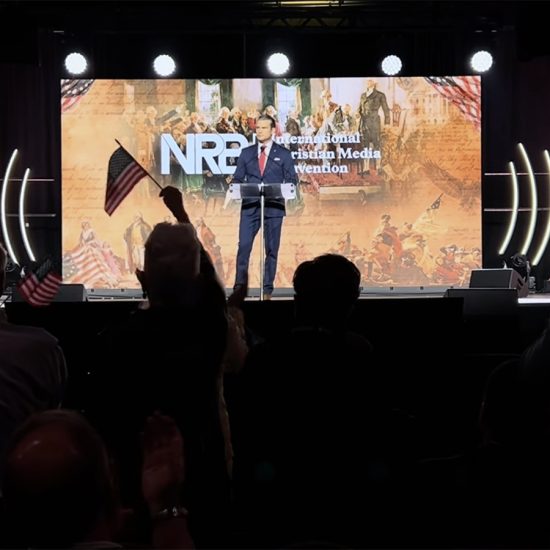
NOTE: This piece was originally published at our Substack newsletter A Public Witness.
Revelation is the book of the Bible that everyone talks about but nobody ever reads.
Many fundamentalist and theologically conservative evangelicals claim to find a playbook for the end times. More progressive Christians — and lots of secular folks too — often dismiss this part of Scripture as irrelevant, embarrassing, and even offensive.
What these competing camps have in common is that neither takes Revelation’s ideas, symbols, and meanings seriously. They don’t wrestle with the text as it is to see what illumination and promise it might hold, especially for the religious, cultural, and political moment American Christianity finds itself in.
That’s what makes Greg Carey’s Rereading Revelation: Theology, Ethics, and Resistance such an impressive book. Those who open its pages get to learn from a New Testament scholar who has specialized in Revelation, eschatology, and apocalyptic literature. We get to glean his wisdom on how this sacred scripture functioned in the church long ago and what it can mean for Christians today.

“Revelation’s primary challenge involves loyalty,” Carey writes at the book’s beginning. “John composed Revelation to call worshipers of Jesus to resist imperial culture, specifically worship devoted to the emperors and imperial gods.”
While there is much that was different about the context in which early Christians heard this text and the circumstances in which American Christians read it today, there are also more similarities than we’d like to acknowledge. For example, Carey names how “Christian Nationalism … requires followers to demonstrate an uncritical patriotism intertwined with Christian identity. Those who resist those values, even on Christian grounds, are nevertheless attacked as being ‘anti-Christian’ or even demonic.”
He then suggests that this is just one stark example of how the text’s critique of Rome “invites contemporary readers to examine analogous systems in our own culture. More than any other New Testament document, Revelation presses contemporary Christians to ask how our social and commercial entanglements may compromise our loyalty to Jesus Christ.”
The volume examines a range of topics in response to this call from the biblical text. Issues of authority, violence, economic inequality, and sexual and gender identity are carefully raised in relation to Revelation’s words and scholars’ analysis of the text. Carey serves as a bridge that helps his readers walk back and forth between ancient passages and current commentary, while — at the risk of confusing the metaphor — also serving as an expert guide along the way by adding his own voice into the mix.
While the book’s socio-political lens is valuable, I wouldn’t want to leave the impression that such explanations and reflections exhaust its contents. The traditional questions around Revelation’s language and theology are front and center as well. Indeed, Carey’s chapter on eschatology is perhaps the most powerful section of the book because of the connections it draws between suffering and hope.
“Revelation testifies to us that hope is both possible and necessary (1:2),” he writes at that chapter’s conclusion. “Hope provides a framework for analyzing evil when it seems far too insidious and complicated for us to assess and resist. Revelation’s hope in particular presents us with the possibility that our own faithful testimony makes us partners with the risen Jesus in overcoming idolatry, violence, and exploitation. And resurrection hope reminds us that God — and only God — is the source of life who can redeem the whole of our embodied lives.”

This fall I’m planning a sermon series intended to help my congregation understand what Revelation is (and isn’t) all about. Given the outsized role this part of Scripture plays in Christian imaginations, I want the community that I shepherd to have the tools to faithfully read it and respond to popular interpretations. Greg Carey’s insights in Rereading Revelation will prominently feature in the messages I proclaim.
By virtue of the subject it tackles and the ground it covers, this book is not a casual read. Still, it is a relatively accessible discussion of Revelation’s richness and what’s at stake when we read it here and now. It’s a book that every preacher should engage with, along with many curious lay leaders looking for a revelation about Revelation.
Carey has graciously agreed to send an autographed copy of Rereading Revelation: Theology, Ethics, and Resistance to one lucky paid reader of A Public Witness, so upgrade your subscription today and you might find yourself with a free copy of these words that are trustworthy and true.
As a public witness,
Beau Underwood





